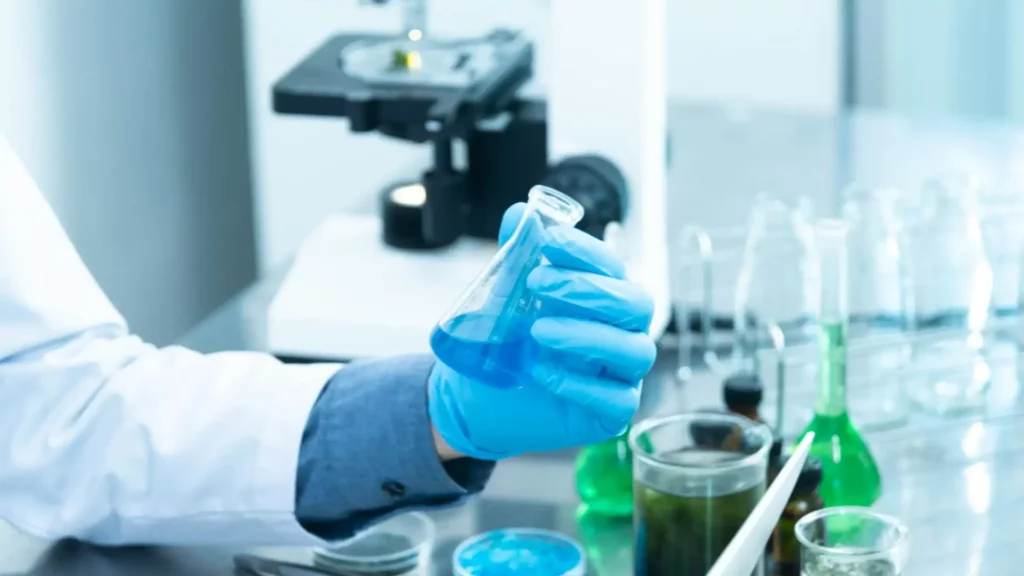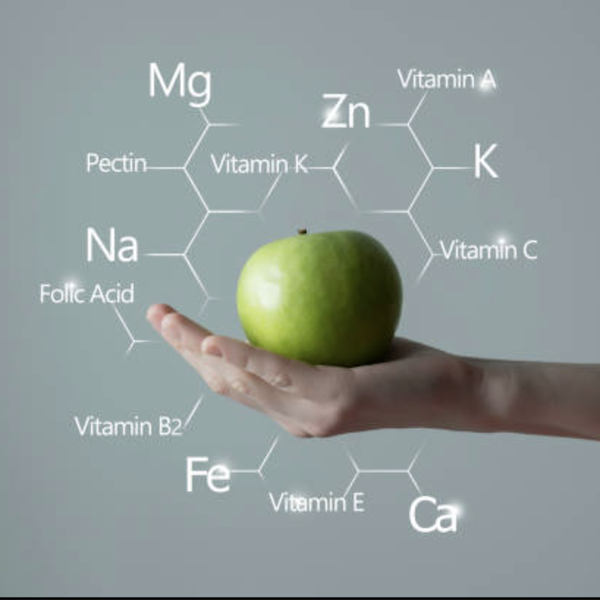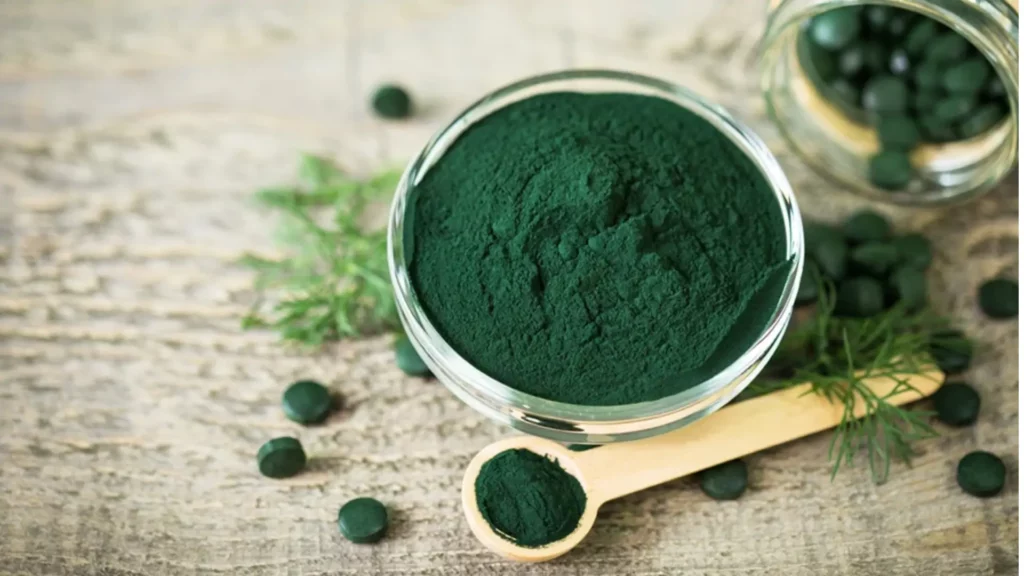In the realm of superfoods, few can match the prowess of Spirulina. This blue-green algae has been consumed for centuries, revered for its dense nutritional profile and myriad health benefits. From its phycobiliproteins to its array of vitamins and minerals, Spirulina offers a wealth of goodness that can profoundly impact human health.
Spirulina is a nutritional powerhouse packed with an impressive array of vital nutrients. Comprising approximately 60-70% complete protein, Spirulina stands out as one of the richest plant-based protein sources available. Alongside its protein content, Spirulina boasts a wealth of essential vitamins including B-complex vitamins and vitamin E, as well as minerals such as iron, magnesium, and calcium. Additionally, Spirulina contains a diverse range of phytonutrients including phycobiliproteins, chlorophylls, and carotenoids, each contributing to its vibrant color and potent health benefits. This nutrient-dense superfood is a testament to nature’s ingenuity, offering a comprehensive blend of nutrients essential for optimal health and vitality.
Phycobiliproteins: The Energetic Essence

At the heart of Spirulina’s vibrant hue lie phycobiliproteins, including phycocyanin and allophycocyanin. These pigment-proteins not only give Spirulina its distinctive blue-green color but also serve as potent antioxidants. They scavenge harmful free radicals in the body, protecting cells from oxidative stress and reducing the risk of chronic diseases such as cancer and heart disease.
Phycocyanin, the predominant phycobiliprotein in Spirulina, is a powerful antioxidant with anti-inflammatory properties. It scavenges harmful free radicals in the body, protecting cells from oxidative stress and reducing the risk of chronic diseases such as cancer and cardiovascular ailments. Phycocyanin has also been shown to support liver health by promoting the regeneration of liver cells and enhancing detoxification processes. Additionally, it exhibits neuroprotective properties, potentially aiding in the prevention of neurodegenerative disorders like Alzheimer’s and Parkinson’s disease.
Allophycocyanin, another phycobiliprotein found in Spirulina, complements the antioxidant effects of phycocyanin. It helps to enhance the immune system by stimulating the production of white blood cells, thereby bolstering the body’s defense against infections and diseases. Allophycocyanin also plays a role in maintaining healthy skin and promoting wound healing.
Overall, the presence of phycobiliproteins in Spirulina contributes to its remarkable health benefits, including immune support, antioxidant protection, anti-inflammatory effects, and potential therapeutic applications in various health conditions. Incorporating Spirulina into one’s diet can provide a natural and potent source of these beneficial compounds, promoting overall well-being and vitality.
Chlorophylls: Nature’s Detoxifiers

Spirulina is rich in chlorophyll, the green pigment responsible for photosynthesis. Chlorophyll boasts powerful detoxifying properties, aiding in the elimination of toxins and heavy metals from the body. By supporting liver function and promoting the production of red blood cells, chlorophyll contributes to overall vitality and well-being.
Spirulina primarily contains chlorophyll a and chlorophyll b, the two main forms of chlorophyll found in plants and algae. These chlorophyll molecules are responsible for Spirulina’s green coloration and offer a host of health benefits when consumed.
Chlorophyll is known for its potent detoxifying properties, aiding in the elimination of toxins and heavy metals from the body. By binding to harmful substances and facilitating their removal, chlorophyll supports liver function and promotes overall detoxification, which is essential for maintaining optimal health.
Furthermore, chlorophyll exhibits anti-inflammatory effects, helping to reduce inflammation in the body and alleviate symptoms associated with conditions such as arthritis and inflammatory bowel disease. Its ability to inhibit inflammatory pathways contributes to its role in promoting overall well-being and reducing the risk of chronic diseases.
Chlorophyll also supports healthy digestion and gut function. It acts as a prebiotic, promoting the growth of beneficial bacteria in the gut microbiome, which is essential for optimal digestion, nutrient absorption, and immune function.
Moreover, chlorophyll has been shown to have antioxidant properties, protecting cells from oxidative damage caused by free radicals. By neutralizing free radicals and reducing oxidative stress, chlorophyll helps to prevent cell damage and may lower the risk of certain diseases, including cancer and cardiovascular disorders.
Carotenoids: Guardians of Eye Health
Spirulina contains a variety of carotenoids, including beta-carotene, zeaxanthin, lutein, and cryptoxanthin. These pigments contribute to Spirulina’s vibrant color and offer numerous health benefits when consumed.
Carotenoids like beta-carotene and zeaxanthin abound in Spirulina, offering numerous benefits for vision and immune function. Beta-carotene, a precursor to vitamin A, promotes healthy eyesight and enhances immune response. Zeaxanthin protects the eyes from harmful UV radiation and may reduce the risk of age-related macular degeneration, a leading cause of blindness.
Beta-carotene, a precursor to vitamin A, is abundant in Spirulina and is known for its antioxidant properties. It helps to neutralize harmful free radicals in the body, protecting cells from oxidative damage and reducing the risk of chronic diseases such as cancer and cardiovascular disorders. Beta-carotene also plays a crucial role in maintaining healthy vision, skin, and immune function.

Zeaxanthin and lutein are carotenoids with specific benefits for eye health. They are concentrated in the macula of the eye, where they act as natural filters, protecting against harmful UV radiation and blue light. Zeaxanthin and lutein help to reduce the risk of age-related macular degeneration, a leading cause of vision loss in older adults. By promoting macular health and supporting visual acuity, these carotenoids contribute to overall eye health and function.
Cryptoxanthin is another carotenoid found in Spirulina, known for its anti-inflammatory and immune-boosting properties. It helps to reduce inflammation in the body and supports immune function, helping to ward off infections and illnesses.
Overall, the carotenoids found in Spirulina offer a range of health benefits, including antioxidant protection, eye health support, anti-inflammatory effects, and immune system enhancement. Incorporating Spirulina into one’s diet can provide a natural and effective way to harness the power of carotenoids for overall health and well-being.
Essential Amino Acids: Building Blocks of Life

Spirulina is a complete protein source, containing all nine essential amino acids vital for muscle repair, immune function, and neurotransmitter synthesis. These amino acids are readily absorbed by the body, making Spirulina an ideal protein supplement for vegetarians, athletes, and individuals seeking to maintain lean muscle mass and enhance athletic performance.
Spirulina is a rich source of essential amino acids, which are the building blocks of proteins that the body cannot produce on its own. The essential amino acids found in Spirulina include:
- Isoleucine: Necessary for muscle metabolism, immune function, and energy production. It also helps regulate blood sugar levels and promotes wound healing.
- Leucine: Plays a key role in muscle protein synthesis, making it essential for muscle growth, repair, and recovery. Leucine also regulates blood sugar levels and supports wound healing.
- Lysine: Important for collagen production, which is essential for skin health, wound healing, and bone formation. Lysine also helps the body absorb calcium and supports immune function.
- Methionine: Required for the synthesis of other amino acids and important for the formation of healthy connective tissues, hair, and nails. Methionine also supports liver health and detoxification processes.
- Phenylalanine: Precursor to neurotransmitters like dopamine, norepinephrine, and epinephrine, which regulate mood, stress response, and cognitive function. Phenylalanine also plays a role in the synthesis of other amino acids and neurotransmitters.
- Threonine: Essential for the formation of proteins and the production of antibodies, which are crucial for immune function and defense against infections. Threonine also supports liver function and may help prevent fatty liver disease.
- Tryptophan: Precursor to serotonin, a neurotransmitter that regulates mood, sleep, and appetite. Tryptophan also supports immune function and may have antioxidant properties.
- Valine: Involved in muscle metabolism and repair, energy production, and the maintenance of nitrogen balance in the body. Valine also helps regulate blood sugar levels and supports cognitive function.
These essential amino acids play critical roles in various physiological processes, including muscle growth and repair, immune function, hormone synthesis, neurotransmitter production, and overall metabolic function. Incorporating Spirulina into one’s diet provides a convenient and complete source of essential amino acids, supporting overall health, muscle development, immune function, and vitality.
Non-Essential Amino Acids: Supporting Overall Health

In addition to essential amino acids, Spirulina provides a plethora of non-essential amino acids crucial for various physiological processes. Glutamine, for instance, supports gut health and immune function, while arginine plays a role in cardiovascular health and wound healing. These amino acids work synergistically to promote overall health and vitality.
Spirulina have non-essential amino acids, which the body can synthesize on its own but are still important for various physiological functions. Some of the non-essential amino acids found in Spirulina include:
- Alanine: Plays a role in energy production, glucose metabolism, and immune function. Alanine also helps regulate blood sugar levels and supports liver health.
- Arginine: Essential for the synthesis of nitric oxide, which helps dilate blood vessels and improve blood flow. Arginine also supports wound healing, immune function, and hormone regulation.
- Aspartic Acid: Acts as a neurotransmitter precursor and plays a role in brain function, memory, and cognitive health. Aspartic acid also supports energy metabolism and immune function.
- Cysteine: Important for the synthesis of glutathione, a powerful antioxidant that protects cells from oxidative damage. Cysteine also supports liver health, detoxification processes, and immune function.
- Glutamine: The most abundant amino acid in the body, essential for immune function, gut health, and muscle repair. Glutamine also plays a role in energy production and may help reduce muscle soreness and fatigue.
- Glycine: Acts as a neurotransmitter precursor and supports brain health, cognitive function, and sleep quality. Glycine also plays a role in collagen production, which is important for skin, joint, and connective tissue health.
- Proline: Essential for collagen synthesis and connective tissue health. Proline also supports wound healing, joint health, and cardiovascular function.
- Serine: Important for the synthesis of neurotransmitters, phospholipids, and proteins. Serine also plays a role in brain function, memory, and cognitive health.
These non-essential amino acids contribute to various physiological processes, including protein synthesis, neurotransmitter production, energy metabolism, immune function, and tissue repair. Incorporating Spirulina into one’s diet provides a natural and balanced source of non-essential amino acids, supporting overall health, vitality, and well-being.
Vitamins: Essential Nutrients for Optimal Function

Spirulina is a treasure trove of vitamins, including B-complex vitamins (B1, B2, B3, B6, B9, B12), vitamin C, and vitamin E. These vitamins play essential roles in energy metabolism, immune function, and antioxidant defense. Vitamin B12, in particular, is of great importance for vegetarians and vegans, as Spirulina is one of the rare plant-based sources of this vital nutrient.
Spirulina is a rich source of vitamins, offering a wide range of essential nutrients that play crucial roles in maintaining overall health and well-being. Some of the vitamins found in Spirulina include:
- Vitamin A: Essential for vision, immune function, and skin health. Vitamin A also supports reproductive health and cell growth and differentiation.
- Vitamin B1 (Thiamine): Important for energy metabolism, nerve function, and carbohydrate metabolism. Thiamine also supports cardiovascular health and may help reduce the risk of neurodegenerative diseases.
- Vitamin B2 (Riboflavin): Essential for energy production, antioxidant defense, and red blood cell formation. Riboflavin also supports healthy skin, vision, and nerve function.
- Vitamin B3 (Niacin): Plays a key role in energy metabolism, DNA repair, and cell signaling. Niacin also supports cardiovascular health, skin health, and cognitive function.
- Vitamin B6 (Pyridoxine): Essential for amino acid metabolism, neurotransmitter synthesis, and immune function. Pyridoxine also supports hormone regulation and may help alleviate symptoms of PMS and morning sickness.
- Vitamin B9 (Folate): Important for DNA synthesis, cell division, and red blood cell formation. Folate also supports fetal development during pregnancy and may help reduce the risk of neural tube defects.
- Vitamin B12 (Cobalamin): Essential for nerve function, DNA synthesis, and red blood cell formation. Vitamin B12 also supports energy metabolism and may help prevent anemia.
- Vitamin C (Ascorbic Acid): A powerful antioxidant that supports immune function, collagen synthesis, and wound healing. Vitamin C also enhances iron absorption and may reduce the risk of chronic diseases such as heart disease and cancer.
- Vitamin E (Tocopherol): An antioxidant that protects cells from oxidative damage and supports immune function. Vitamin E also promotes skin health, cardiovascular health, and cognitive function.
These vitamins play critical roles in various physiological processes, including energy metabolism, immune function, cell growth and repair, and antioxidant defense. Incorporating Spirulina into one’s diet provides a convenient and natural source of vitamins, supporting overall health, vitality, and longevity.
Minerals: Building Blocks for Health

From iron and magnesium to calcium and potassium, Spirulina is teeming with essential minerals necessary for maintaining healthy bones, muscles, and nerve function. Iron combats fatigue and prevents anemia, while magnesium promotes relaxation and supports cardiovascular health. Spirulina’s mineral content ensures optimal physiological function and vitality.
Spirulina is a rich source of minerals, offering a diverse array of essential nutrients that play vital roles in maintaining overall health and well-being. Some of the minerals found in Spirulina include:
- Iron: Essential for oxygen transport, energy production, and immune function. Iron also supports cognitive function and helps prevent anemia.
- Magnesium: Important for muscle function, nerve transmission, and bone health. Magnesium also supports cardiovascular health, regulates blood sugar levels, and promotes relaxation and stress reduction.
- Calcium: Essential for bone and teeth health, muscle contraction, and nerve function. Calcium also supports cardiovascular health and may help reduce the risk of osteoporosis.
- Potassium: Important for fluid balance, nerve transmission, and muscle function. Potassium also helps regulate blood pressure and supports cardiovascular health.
- Zinc: Essential for immune function, wound healing, and DNA synthesis. Zinc also supports reproductive health, cognitive function, and antioxidant defense.
- Manganese: Important for bone formation, carbohydrate metabolism, and antioxidant defense. Manganese also supports collagen synthesis and may help reduce inflammation.
- Copper: Essential for iron metabolism, connective tissue formation, and antioxidant defense. Copper also supports energy production and immune function.
- Selenium: Important for thyroid function, antioxidant defense, and immune function. Selenium also supports reproductive health and may help reduce the risk of certain cancers.
- Phosphorus: Essential for bone and teeth health, energy metabolism, and cell membrane structure. Phosphorus also supports kidney function and acid-base balance.
- Chromium: Important for insulin sensitivity, carbohydrate metabolism, and blood sugar regulation. Chromium also supports cardiovascular health and may help improve lipid profiles.
These minerals play critical roles in various physiological processes, including bone health, muscle function, immune function, energy metabolism, and antioxidant defense. Incorporating Spirulina into one’s diet provides a convenient and natural source of minerals, supporting overall health, vitality, and longevity.
The Benefits of Spirulina for your Health
The consumption of Spirulina offers a multitude of health benefits, including:
- Enhanced Immune Function: Spirulina’s antioxidant compounds bolster the immune system, helping to ward off infections and illnesses.
- Improved Energy Levels: Rich in iron and B-vitamins, Spirulina combats fatigue and promotes sustained energy levels throughout the day.
- Detoxification: Chlorophyll and phycocyanin aid in detoxifying the body by eliminating toxins and heavy metals, promoting overall well-being.
- Heart Health: Spirulina’s cholesterol-lowering effects and cardiovascular support contribute to a healthy heart and reduced risk of heart disease.
- Eye Health: The carotenoids in Spirulina protect against age-related macular degeneration and promote optimal vision.
- Muscle Recovery: Spirulina’s high protein content and essential amino acids aid in muscle repair and recovery, making it an excellent post-workout supplement.
- Weight Management: Spirulina’s nutrient density and appetite-suppressing effects may aid in weight loss and weight management when incorporated into a balanced diet.
And these are just the main benefits of spirulina. The substances in spirulina also protect the skin, with the help of antioxidants, they help to stop the signs of aging. Also, spirulina is rich in Phycocyanin, which can be used as a remedy against heart diseases and even cancer.
In Conclusion
Spirulina stands as a nutritional powerhouse, offering a diverse array of nutrients that promote overall health and well-being. From its antioxidant-rich phycobiliproteins to its muscle-building amino acids and vision-protecting carotenoids, Spirulina embodies nature’s gift to human health. Whether consumed as a dietary supplement or incorporated into culinary creations, Spirulina holds the potential to nourish and rejuvenate the body, unlocking vitality and vitality for those who embrace its potent benefits.

